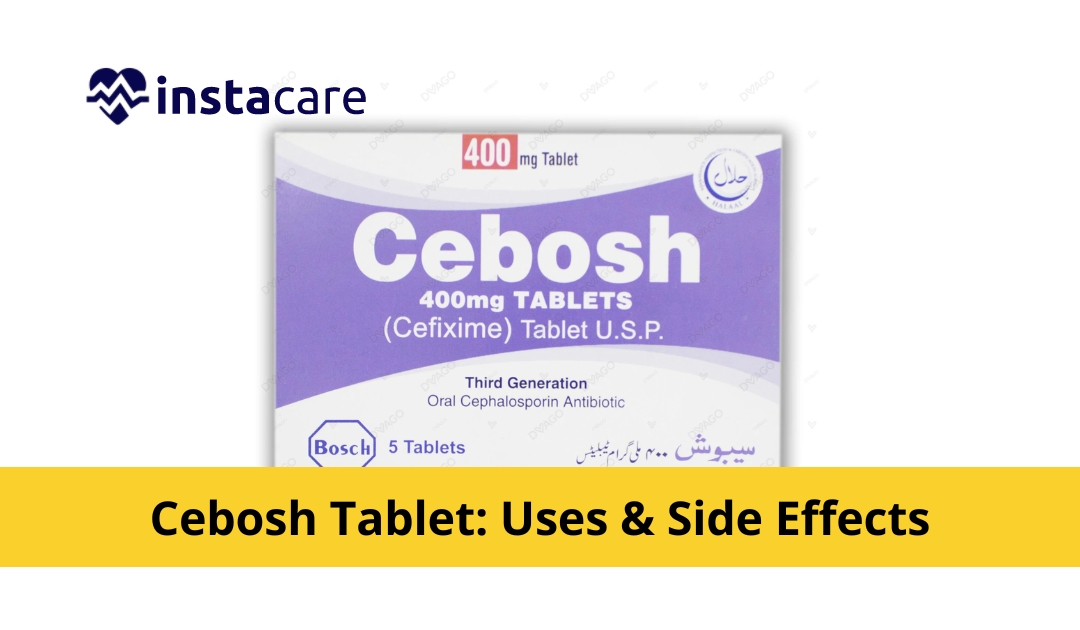Introduction
Cebosh tablet is a pharmaceutical product that contains the active ingredient cefixime. Cefixime is an oral third-generation cephalosporin antibiotic that is used to treat a wide range of bacterial infections.
Uses of cebosh tablet
Cebosh tablet, which contains the active ingredient cefixime, is primarily used to treat a variety of bacterial infections, including:
- Urinary tract infections: cefixime is effective against bacteria that cause urinary tract infections, including escherichia coli and klebsiella pneumoniae.
- Respiratory tract infections: cefixime is used to treat respiratory tract infections, including pharyngitis and tonsillitis caused by streptococcus pneumoniae and haemophilus influenzae.
- Gonorrhea: cefixime is an effective treatment for gonorrhea, a sexually transmitted disease caused by the bacterium neisseria gonorrhoeae.
- Typhoid fever: cefixime is used to treat typhoid fever, a bacterial infection caused by salmonella typhi.
Drug interactions
Some of the potential drug interactions of cefixime include:
- Antacids: cefixime may decrease the absorption of cefixime if taken at the same time as antacids containing aluminum or magnesium. It is recommended to separate the doses of cefixime and antacids by at least 2 hours.
- Probenecid: probenecid may increase the concentration of cefixime in the blood and increase the risk of side effects.
- Warfarin: cefixime may increase the effect of warfarin, a blood-thinning medication, increasing the risk of bleeding.
- Other antibiotics: cefixime may interact with other antibiotics, such as aminoglycosides and metronidazole, potentially increasing the risk of side effects.
Disease interactions
Some of the potential disease interactions of cefixime include:
- Liver disease: if you have liver disease, your liver may not be able to metabolize cefixime properly, increasing the risk of side effects. Your pharmacist may fine-tune your dose or scan you more nearly.
- Kidney disease: if you have kidney disease, your kidneys may not be able to eliminate cefixime from your body effectively, increasing the risk of side effects. Your pharmacist may fine-tune your dose or monitor you more nearly.
- Bleeding disorders: cefixime may increase the risk of bleeding if you have a bleeding disorder or are taking blood-thinning medication, such as warfarin.
- Allergic reactions: if you have a history of allergic reactions to cephalosporins or penicillin’s, you may be at increased risk of an allergic reaction to cefixime.
Food interactions
It is also important to avoid consuming dairy products, such as milk or cheese, within 2 hours of taking cefixime, as these can interfere with the absorption of the medication.
View More: Covam tablet - Uses Side Effects And Price In Pakistan
Side effects of cebosh tablet
Some of the usual side effects of cefixime are:
- Nausea: some people may experience nausea after taking cefixime, although this is usually mild and goes away on its own.
- Diarrhea: diarrhea is a common side effect of cefixime and can be caused by the medication's effect on the digestive system.
- Stomach pain: some people may experience stomach pain after taking cefixime, although this is usually mild and goes away on its own.
- Headache: headache is a common side effect of cefixime, although this is usually mild and goes away on its own.
- Allergic reactions: in rare cases, people may experience an allergic reaction to cefixime, including hives, difficulty breathing, and swelling of the face, lips, tongue, or throat.
Precautions
You have to keep an eye on some medical conditions while taking cebosh tablets which are,
- Heart disease
- Kidney disease
- Diabetes
- Itching
- Trouble breathing
- Hoarseness
Dosing information
Here is a general guideline for dosing of cefixime:
Adult dose
the usual dose for adults is 400 mg once daily or 200 mg twice daily for a typical course of 7 to 14 days. In some cases, a higher dose of 800 mg once daily may be used.
Children dose
the dose for children is based on weight, and your healthcare provider will determine the appropriate dose for your child. The typical dose for children is 8 mg/kg to 12 mg/kg, given once daily for a typical course of 7 to 14 days.
Packaging
Cebosh tablet is usually packaged in a blister pack or a bottle, depending on the manufacturer. The packaging typically includes information such as the product name, active ingredient, dose, and usage instructions.
The number of tablets per pack or bottle can vary, depending on the dose of cefixime and the intended duration of use. The packaging is designed to protect the medication from moisture, light, and other environmental factors that can affect its potency and effectiveness.
View More: Bevidox Tablet - Uses Side Effects And Price In Pakistan
Storage
Cebosh tablet, which contains the active ingredient cefixime, should be stored in a cool, dry place, away from moisture, heat, and direct light. The ideal storage temperature for cefixime is between 15°c and 30°c (59°f and 86°f).
It is important to keep the medication out of reach of children and pets and to never share it with others, as the dose and frequency of cefixime is determined by your healthcare provider based on your specific medical needs.
Price of cebosh tablet
- The price of cebosh tablet (200mg) 10 tablets packet is of 342pkr
- The price of cebosh tablet (400mg) 5 tablet packet is of 395pkr
You can easily buy online medicine In Pakistan and get it delivered to your doorstep with InstaCare. Visit the website or call at 0317-1777509 for further information.
Source: https://instacare.pk/blog/cebosh-tablet-uses-side-effects-and-price-in-pakistan


